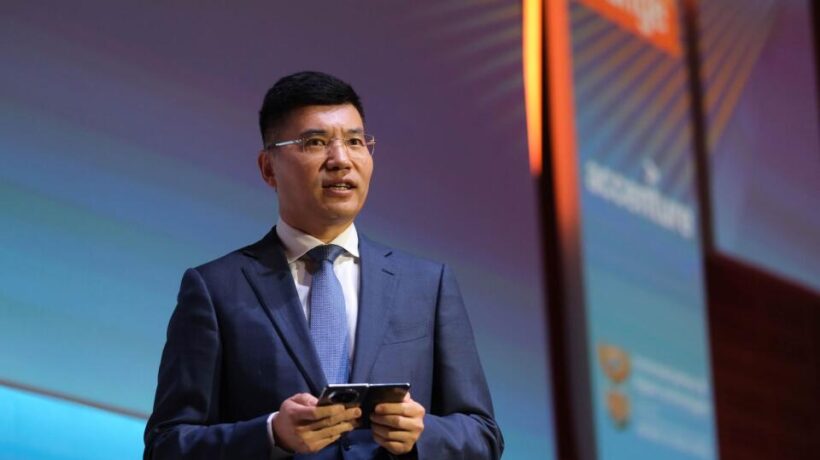In his opening keynote for AfricaCom 2023, Africa’s largest tech conference, currently underway in Cape Town; Leo Chen, President of Huawei Sub-Saharan Africa laid out how two transformative forces, digitalisation and decarbonisation, are driving humanity towards an intelligent world. Africa, he said, can ride a new wave of “digital-physical convergence”, which marks a new phase of digitalisation, to leapfrog development in the digital economy era.
To achieve these goals, Chen believes that, “Africa’s first priority must be to accelerate the development of connectivity infrastructure.”
“That is because, in the future, more people, things, and applications will be connected,” he said. “This process will generate far more data than it does today. So, we need a more secure, reliable, and developed network to act as the foundation for digitalisation.”
This infrastructure, he pointed out, should be more advanced, more future-proof, and more inclusive and accessible. Achieving the first of these simply means ensuring that African countries have access to the same leading-edge connectivity technology as the rest of the world, such as Huawei’s 4G, 5G and even 5G-Advanced solutions. To be future-proof, meanwhile, infrastructure should support future application scenarios, like smart solutions in vertical industries and smart homes. And while inclusive connectivity remains a significant challenge on the continent, there is hope on that front too.
For example, Chen said, “Huawei’s cost-effective wireless RuralStar solution can provide remote areas with broadband coverage, access to the Internet, and digital services. This bridges the digital gap and enables inclusive development.”.
According to Chen, embracing the full capabilities of the cloud is another important facet of digitalisation for African countries.
“It is important that African countries establish national cloud data centres to provide computing resources to the governments, public and SMEs,” he said. “This will drive the innovation ecosystem.
“By establishing ‘e-Government Clouds’”, he added, “governments can improve operational efficiency, and provide citizens with one-stop and innovative services.”
Using cloud service is also a simple and economical way for African countries to obtain AI capabilities. For example, as the world’s fastest-growing cloud service provider, Huawei Cloud is equipped with the Pangu AI model which is, “born for industry” and can also be used in Africa for agriculture, and disaster prevention and mitigation, improving the livelihood of African people.
As Chen pointed out, adopting these kinds of digital technologies will also help drive decarbonisation across the continent. In fact, he said, the ICT industry can help reduce global carbon emissions by 20%, equivalent to 10 times its own emissions, and can also make digital energy production more efficient.
Among the examples provided by Chen was its work at Scatec, the largest ground PV plant project in Africa. The project can provide clean electricity to more than 120 000 households. Huawei’s solution, he said, improved the plant’s energy yield by over two percent, and improved O&M efficiency by more than 40%.
“Huawei’s solutions can also help carriers to cut their carbon emissions,” he said. “For example, across more than 10 African countries, we have built over 6 000 green sites, and helped carriers save US40 million.”
“Moreover, Huawei’s Smart PV can be used for scenarios like industrial and commercial, household, and micro-grid solar,” he added “Therefore, it can help the African people gain a sustainable, affordable, and reliable power supply.”
Chen also highlighted the fact that it is ‘people’ that drives all these innovations. “This is why Huawei has always put digital talent cultivation at the centre of the digital ecosystem,” he said. “Over the past five years, Huawei has trained 100 000 digital talents in Sub-Saharan Africa. Between 2022 and 2025, we will train another 100 000.” He also said, Huawei believed in localised joint innovation, and are proud of being supporting the world well-known M-Pesa and Mobile Money innovations in Africa.
“To accelerate digital Africa is to create a prosperous and sustainable Africa,” Chen concluded. “To this end, we are ready to work with all parties to achieve this great mission.”
As a key participant and sponsor at AfricaCom, Huawei presented its latest technologies and solutions in a 350-meter exhibition and supported and organized four forums, including the African Ministerial Forum for a Future-Oriented Digital Infrastructure, Africa Fibre Forum 2023, Africa Operations Transformation Forum 2023, and the Africa 5G Summit.







